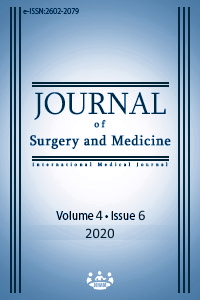Examination of the relationship between health literacy, concern and anxiety in adults with diabetes mellitus or hypertension and comparison with individuals without chronic disease
Keywords:
Health Literacy, Chronic diseases, Worry and anxietyAbstract
Aim: The low level of health literacy in our country can cause worry and anxiety. The effect of this situation in individuals with chronic diseases was compared with healthy individuals. In our study, the level of health literacy (HL) of individuals with a chronic disease (Diabetes Mellitus (DM) or Hypertension (HT)) who applied to the Family Medicine outpatient clinic was determined. The effect of HL on anxiety levels in individuals with and without chronic diseases was investigated.
Methods: This cross-sectional study included those with chronic diseases (DM or HT) and healthy individuals. The data were obtained with Adult Health Literacy Scale (AHLS), Anxiety, Anxiety Scale (WAS) and descriptive questionnaire. SPSS 22 statistics program was used for statistical analysis. Descriptive statistics, chi-square analysis, ANOVA and Pearson correlation analysis were used in statistical evaluation.
Results: The mean scores of Adult Health Literacy Scale (AHLS) were 6.21 for individuals with HT, 6.58 for individuals with DM and 14.92 for healthy subjects. The mean scores of Worry and Anxiety Scale (WAS) were 46.42 in individuals with HT, 44.54 in individuals with DM and 34.19 in healthy individuals. The scores of scales were significantly different among individuals with and without chronic diseases (DM or HT) (P<0.01). A significant negative correlation was found between the scores of WAS and AHLS among individuals with DM and HT (P<0.01, P<0.01, r=-0.35, r=-0.45, respectively).
Conclusion: This study showed that individuals with DM and HT had lower health literacy levels and higher worry and anxiety scores than healthy individuals. It was found that low health literacy level was associated with chronic diseases and inversely related to worry and anxiety.
Downloads
References
Güven DY, Bulut H, Öztürk S. Sağlık Bilimleri Fakültesi Öğrencilerinin Sağlık Okuryazarlığı Düzeylerinin İncelenmesi/Examining the Health Literacy Levels of Health Sciences Faculty Students. Journal of History Culture and Art Research. 2018;7(2):400-9. doi: 10.7596/taksad.v7i2.1511
Mitchell B, Begoray D. Electronic personal health records that promote self-management in chronic illness. OJIN: The Online Journal of Issues in Nursing 2010;15(3):1B-10B. doi: 10.3912/ojin.vol15no03ppt01
Ozdemir H, Alper Z, Uncu Y, Bilgel N. Health literacy among adults: a study from Turkey. Health education research 2010;25(3):464-77. doi: 10.1093/her/cyp068
Tanrıöver MD, Yıldırım HH, Ready FND, Çakır B, Akalın HE. Türkiye Sağlik okuryazarliği araştirmasi. Ankara: Sağlık-sen; 2014.
Yılmazel G, Çetinkaya F. Sağlık okuryazarlığının toplum sağlığı açısından önemi. TAF Prev Med Bull 2016;15(1):69. doi: 10.5455/pmb.1-1448870518
Sezer A, Kadıoğlu H. Yetişkin Sağlik Okuryazarliği Ölçeği’nin geliştirilmesi. Journal of Anatolia Nursing and Health Sciences 2014;17(3):165-70.
Akyay A. Endişe ve Anksiyete Ölçeği, Problemlere Karşı Olumsuz Tutum Ölçeği ve Bilişsel Kaçınma Ölçeği, Türkçe uyarlanması, geçerliliği ve güvenirliliği.: Üsküdar Üniversitesi; 2016.
Chinn D. Critical health literacy: A review and critical analysis. Social science & medicine 2011;73(1):60-7. doi: 10.1016/j.socscimed.2011.04.004
Talbot L, Verrinder G. Promoting health: the primary health care approach. 4th ed. Australia: Elsevier Health Sciences; 2010.
Copurlar CK, Kartal M. Sağlık Okuryazarlığı Nedir? Nasıl Değerlendirilir? Neden Önemli? Turkish Journal of Family Medicine and Primary Care. 2016;10(1):43-7. doi: 10.5455/tjfmpc.193796
Jovanic M, Zdravkovic M, Stanisavljevic D, Jovic Vranes A. Exploring the Importance of Health Literacy for the Quality of Life in Patients with Heart Failure. Int J Environ Res Public Health. 2018;15(8):1-13. doi: 10.3390/ijerph15081761
Wong KK, Velasquez A, Powe NR, Tuot DS. Association between health literacy and self-care behaviors among patients with chronic kidney disease. BMC Nephrol. 2018;19(1):196. doi: 10.1186/s12882-018-0988-0
Cavanaugh KL, Wingard RL, Hakim RM, Eden S, Shintani A, Wallston KA, Huizinga MM, Elasy TA, Rothman RL, Ikizler TA. Low health literacy associates with increased mortality in ESRD. Journal of the American Society of Nephrology ASN. 2010;21(11):1979-85. doi: 10.1681/ASN.2009111163
Chajaee F, Pirzadeh A, Hasanzadeh A, Mostafavi F. Relationship between health literacy and knowledge among patients with hypertension in Isfahan province, Iran. Electron Physician. 2018;10(3):6470-7. http://dx.doi.org/10.19082/6470
Temel AB, Çimen Z. Kronik hastaliği olan yaşli bireylerde sağlik okuryazarliği, sağlik algisi ve ilişkili faktörler. Ege Üniversitesi Hemşirelik Fakültesi Dergisi. 2017;33(3):105-25.
Filiz E. Sağlık okuryazarlığının gebelik ve sağlık algısı ile ilişkisi[thesis]. Konya: Selcuk University Faculty of Health Sciences; 2015.
İlnem C, Turhan H. Tip 2 diabetes mellituslu hastalarda tedavi şekline ve hastalik süresine göre depresyon ve anksiyete[thesis]. Istanbul: Taksim Training and Research Hospital; 2017.
Korkmaz T. Konya Numune Hastanesi Göğüs Hastalıkları Servisinde kronik obstrüktif akciğer hastalığı (KOAH) tanısı ile yatan hastaların anksiyete, depresyon ve sosyal destek düzeylerinin belirlenmesi. Konya: Selçuk University Faculty of Health Sciences; 2008.
Mantar A. Anksiyete Duyarlılığı İndeksi-3'ün Türkçe formunun geçerlik ve güvenilirlik çalışması. Izmir: Dokuz Eylul University Faculty of Medicine; 2008.
Downloads
- 777 1212
Published
Issue
Section
How to Cite
License
Copyright (c) 2020 Muhammed Mustafa Beyoğlu, Dilek Avcı
This work is licensed under a Creative Commons Attribution-NonCommercial-NoDerivatives 4.0 International License.
















